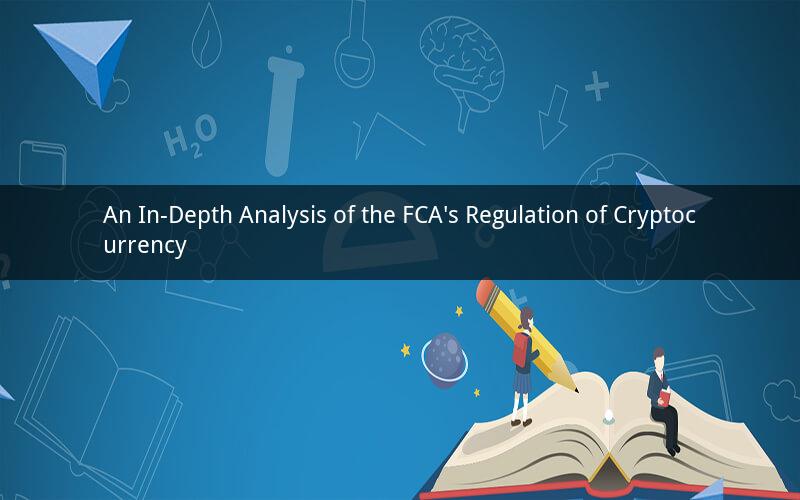
The rise of cryptocurrency has sparked a global debate on its regulation and the role of financial authorities in overseeing this emerging asset class. One of the key regulatory bodies in this discussion is the Financial Conduct Authority (FCA) in the United Kingdom. This article delves into the FCA's regulatory stance on cryptocurrency, examining the extent of its control and the implications for businesses and consumers.
I. Overview of Cryptocurrency and its Regulation
1. Cryptocurrency: A Brief Introduction
Cryptocurrency, a digital or virtual form of currency that uses cryptography for security, has gained immense popularity in recent years. Bitcoin, the first and most well-known cryptocurrency, was launched in 2009. Since then, thousands of other cryptocurrencies have emerged, each with its unique characteristics and use cases.
2. The Need for Regulation
Given the rapid growth and speculative nature of the cryptocurrency market, regulators around the world have expressed concerns about investor protection, market manipulation, and financial stability. As a result, various countries, including the United Kingdom, have implemented regulatory frameworks to govern cryptocurrency-related activities.
II. The FCA's Role in Cryptocurrency Regulation
1. The FCA's Mission
The FCA, established in 2013, is an independent public body that regulates financial services in the UK. Its mission is to protect consumers, ensure fair competition, and maintain the stability of the financial system. In this context, the FCA has taken an active role in regulating cryptocurrency-related activities.
2. The FCA's Approach to Cryptocurrency Regulation
The FCA has adopted a risk-based approach to cryptocurrency regulation. This means that it focuses on identifying and addressing the risks associated with cryptocurrency activities, rather than imposing blanket bans or restrictions. The FCA's approach can be summarized as follows:
a. Registration and Authorization
The FCA requires firms that provide cryptocurrency-related services to register and obtain authorization. This includes exchanges, wallet providers, and other businesses that facilitate cryptocurrency transactions.
b. Consumer Protection
The FCA is committed to protecting consumers from scams, fraud, and other risks associated with cryptocurrency. It has issued guidance on best practices for firms and investors, and it has taken action against firms that engage in deceptive or fraudulent practices.
c. Market Integrity
The FCA aims to ensure market integrity by addressing concerns related to market manipulation, insider trading, and other illegal activities. It has taken action against firms that engage in such activities and has provided guidance on best practices for market participants.
III. Implications of FCA's Cryptocurrency Regulation
1. Benefits for Consumers
The FCA's cryptocurrency regulation offers several benefits for consumers. By requiring firms to register and obtain authorization, the FCA helps ensure that consumers are dealing with reputable businesses. Additionally, the FCA's focus on consumer protection helps to prevent scams and fraud.
2. Challenges for Businesses
While the FCA's regulation aims to protect consumers, it also presents challenges for businesses operating in the cryptocurrency market. Firms must comply with a complex set of regulations, which can be costly and time-consuming. Moreover, the FCA's risk-based approach means that businesses must be vigilant about identifying and mitigating potential risks.
3. The Impact on the Cryptocurrency Market
The FCA's cryptocurrency regulation has had a significant impact on the market. By addressing concerns related to market manipulation and financial stability, the FCA has helped to create a more mature and reliable cryptocurrency ecosystem. However, the regulation has also led to some criticism, with some arguing that it could stifle innovation and hinder the growth of the market.
IV. The FCA's Future Outlook on Cryptocurrency
1. Evolving Regulatory Landscape
The FCA recognizes that the cryptocurrency market is rapidly evolving, and it is committed to adapting its regulatory approach accordingly. As new technologies and use cases emerge, the FCA will continue to monitor the market and assess the risks associated with cryptocurrency-related activities.
2. International Collaboration
The FCA collaborates with other regulatory bodies around the world to address the global nature of the cryptocurrency market. By working together, regulators can share best practices, identify emerging risks, and develop a coordinated approach to cryptocurrency regulation.
V. Conclusion
The FCA's regulation of cryptocurrency is a crucial aspect of the evolving regulatory landscape in the UK. By focusing on consumer protection, market integrity, and the overall stability of the financial system, the FCA plays a vital role in shaping the future of the cryptocurrency market. While challenges remain, the FCA's efforts to regulate cryptocurrency have helped to create a more mature and reliable ecosystem.
Questions and Answers:
1. Question: How does the FCA define "cryptocurrency-related services"?
Answer: The FCA defines "cryptocurrency-related services" as any activity involving the buying, selling, transferring, exchanging, or holding of cryptocurrencies, as well as related services such as wallet provision and custodianship.
2. Question: What are the main risks associated with cryptocurrency?
Answer: The main risks associated with cryptocurrency include price volatility, security vulnerabilities, fraud, market manipulation, and regulatory uncertainty.
3. Question: Can individuals trade cryptocurrencies without any restrictions in the UK?
Answer: Individuals can trade cryptocurrencies in the UK, but they must be aware of the risks and comply with any relevant regulations. The FCA has not imposed a general ban on cryptocurrency trading, but it does regulate firms that provide cryptocurrency-related services.
4. Question: How can consumers protect themselves from cryptocurrency scams?
Answer: Consumers can protect themselves from cryptocurrency scams by conducting thorough research on the businesses they deal with, being wary of unsolicited investment opportunities, and never sharing personal or financial information with unverified sources.
5. Question: What is the FCA's stance on decentralized finance (DeFi)?
Answer: The FCA is monitoring the DeFi space closely and is considering its implications for consumer protection and financial stability. The FCA has not yet issued specific guidance on DeFi, but it will continue to assess the risks and evaluate the need for further regulation.